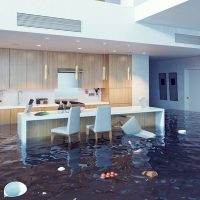What Lies Beneath The Surface: When Unseen Water Damage Can Cause Serious Problems

After a flood, storm, or other event that leads to water buildup in your home, we often try to clean up the damage in front of us and move on. Even after the damage appears to be cleaned up and dried, however, water might not be done damaging your home. Effects of water damage and leaks can linger in the days, months, and even years afterward. If this damage was connected to an event covered under your homeowner’s insurance policy, you might be able to recover if the right steps were taken after the incident.
An insurance company, to protect their own bottom line, might frustrate or deny your attempts to recover what you deserve, however. There are certain types of water damage a homeowner will need to look out for and address, for example:
- Structural and Foundational Issues
Most materials in a home don’t respond well to long term water exposure. Water can corrode metal, rot wood, peel paint, and soften drywall. Most alarmingly, much of this damage can take place under your floors or behind your walls without you even noticing. Months or years can pass before a problem becomes noticeable – and expensive.
Your insurer will undoubtedly try to deny a claim connecting long-term damage to a long-past storm incident. They will claim instead that the homeowner’s neglect or some other non-insured cause contributed to the damage. Your best bet is to carefully document all damage sustained from an insured incident, and inspect for any non-obvious damage in your home’s interior as soon as you are able.
- Mold and Mildew Damage
Mold can start growing within 1 to 2 days after a flood or other water damage incident. Once started, mold is difficult to reduce and eradicate. Spores spread quickly from an affected area to your home to other rooms and common areas. Mold can not only damage and destroy property, but can have serious health impacts on your family. Mold damage may be covered by your insurance but usually under the condition that it was caused by a covered event under the policy. Insurers will frequently deny mold damage claims if they can shift blame to the homeowner or some other non-insured cause.
- Fire and Electrical Hazards
Water and electricity don’t mix. Unnoticed and untreated water leaks can damage and corrode electrical wires. Even worse, water can contact electrical circuitry in a way that can spark a fire. The risks of fire and electrocution are dangerous, as too are the risks your insurer will deny a claim under these circumstances. You want to document all possible damage as well as possible, not only to avoid danger but to avoid issues with your insurer later on.
- Respiratory Illnesses and Other Health Hazards
Mold spores are airborne and can spread through your home naturally or through your HVAC system. Reactions to mold exposure can be immediate or delayed, and may include allergic reactions as mild as sneezing or as serious as asthma attacks and other respiratory problems. The United States Environmental Protection Agency (EPA) recognizes the direct links associated between mold exposure and health hazards in people.
- Pest Infestations
One sign of hidden water damage in your home may be a rise in household pests. When water or moisture damages concrete and wood, tiny invaders can use newfound cracks and crevices to enter your home. Insects and even mice or rats can take advantage of water damage to wreak havoc on a . These pests are not only a nuisance but can track germs and disease into all areas of your home.
When to Call an Attorney About Water Damage to Your Home
Just as easily as any of the above situations can be caused by an insured water damage event, your insurance company may try to delay, deflect, or deny your claim. In these situations, you want the help of an experienced Florida property damage attorney to look out for your interests and enforce the terms of your insurance policy. Insurance companies have responsibilities under the Florida Homeowner’s Bill of Rights, and under other aspects of Florida law.
Our Daytona, Florida Property Damage Attorneys Will Fight For Your Rights in a Water Damage Claim
At Bundza & Rodriguez, P.A., our attorneys have been there before for frustrated homeowners dealing with a lingering water damage claim. Sometimes an insurance company will try to turn their backs on property owners in these situations, and we know the tactics they will use. Whether you need help during a claim or feel litigation might be necessary, call our Daytona law offices at 386-252-5170. Our Daytona Beach property damage attorneys are also available online to set up a consultation any time.
Source:
epa.gov/mold/mold-and-health

